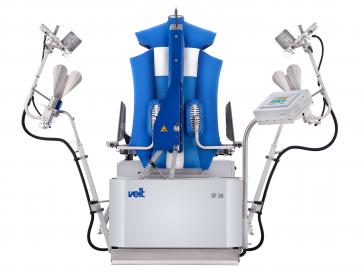VEIT Group is presenting highlights at Texprocess 2019
At the Texprocess trade fair in Frankfurt/Main, Germany (May 14th to 17th 2019) VEIT Group will present on more than 400 m² the latest highlights in the areas of ironing, finishing, pressing and fusing in the garment industry as well as automotive and interior sectors.
"Pressing for Excellence" is the corporate slogan of the VEIT Group. In addition, this year's motto at Texprocess is "LOVEIT" which is a wordplay on "love it" or “love VEIT”. In the words of VEIT Group President Günter Veit: “Our motto stands for the passion that we have for the engineering of our products, our love of perfection and our devotion to our customers. This is the basis of their trust in our products. We want to offer our customers value not only now, but also for the future which we believe will be more digital and more sustainable. Both Industry 4.0 readiness, as well as the good of operator and environment are essential components of our product development efforts.”
Among the large portfolio of high-performance technology presented at the trade show, there is a significantly improved shirt finisher SF 26. With the new model SF 26, VEIT manages to further increase both the functionality and the ergonomics of the shirt finisher. For the customer, this optimisation in application technology is reflected in higher quality of the finished product and simplified operation.
Combined with the improved FS shirt folding table series – a highly successful product – VEIT offers true streamlining potential while maintaining high quality levels when folding shirts, blouses and polos in 3 versions.
Reacting to the customers’ demands, VEIT has equipped their popular BX fusing machines – BXT, the universal solution for shirts and outerwear – with a separate feeding belt and a 7” colour operating panel. These changes make the BX fully industry 4.0 ready and helps to further improve the ergonomics and energy efficiency.
In order to increase flexibility in the shaping of textiles, VEIT will present a new solution for high-quality finishing of the elbow seam in the area of BRISAY machines – the BRI 860 VC sleeve seam finish pressing machine. The 8430 universal multiform finisher was enhanced to cover an even wider range of applications. It can now also be used for finishing, among other items, also polos, T-shirts, blouses, blousons and jackets.
In addition to the innovative machine highlights, VEIT has also developed special solutions for customers' investment decisions. "More and more companies that are making investments are not only looking at the purchase price, but rather at the total lifetime cost of ownership," explains Vice President Christopher Veit. VEIT is presenting two interesting offers to meet this trend:
Customers may choose to buy a machine according to the “Pay Per Piece” system, which means that they pay for how much the machine is used, instead of a full up-front investment. This reduces the investment risk and allows more flexible reactions to especially to scalable business opportunities. Alternatively, when purchasing a machine the traditional way, customers can limit operating costs, extend the machine’s lifespan and achieve improved machine availability by signing a service contract. With its global service and partnership network, VEIT Group can offer this service worldwide.
VEIT
VEIT GmbH
















